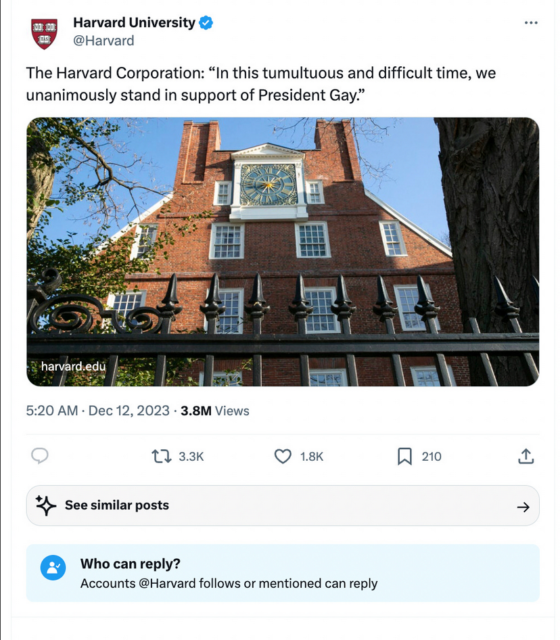 Chris Bray discusses the sure-to-be-continued saga of a plagiarist — who’s also a full-time water-carrier for terrorism — who happens (for the moment) to head
Chris Bray discusses the sure-to-be-continued saga of a plagiarist — who’s also a full-time water-carrier for terrorism — who happens (for the moment) to head HAMAS University Harvard University:
Harvard stands firmly behind President Claudine Gay, a remarkably undistinguished scholar and academic leader who has been lavishly overpraised and promoted beyond her ability for three decades. They do this, they have just explained, because Harvard is deeply committed to a culture of academic freedom, open discourse, and cultural pluralism:
In this tumultuous and difficult time, we unanimously stand in support of President Gay. At Harvard, we champion open discourse and academic freedom, and we are united in our strong belief that calls for violence against our students and disruptions of the classroom experience will not be tolerated. Harvard’s mission is advancing knowledge, research, and discovery that will help address deep societal issues and promote constructive discourse, and we are confident that President Gay will lead Harvard forward toward accomplishing this vital work.
And so here’s the tweet — I insist on still calling them tweets — in which Harvard announces that it has posted its public letter on its insistent promotion of open and constructive discourse:
We stand for open discourse! (Replies are closed.)
Coprophagiacs eat so much shit that it stops being shit, and just becomes the thing they eat. Every word of a statement from the enormously high-status trustees of an enormously high-status institution is just ludicrous. They self-refute, casually, without noticing.
Every day now, I think about a term that lawyers use: a colorable argument. If you have a colorable argument, you can file your lawsuit without being instantly thrown out of the courtroom. You may not have the winning argument, and you may not even have a really good argument, yet, but you have enough of an argument that you can start. Then, through the discovery process and with some luck and hard work, maybe you can build the actual winning argument. But for now, you have some not-totally-implausible factish claims, and you can more or less connect it all to a law of some kind, and you can walk into the courtroom without the judge bursting into laughter. You have a colorable argument; you have the bare minimum.
Look how much of the culture is made up of people who don’t have a colorable argument. Look how much total nonsense streams by.
Now, about those plagiarism allegations against the president of what is alleged to be one of the nation’s most prestigious universities:
With regard to President Gay’s academic writings, the University became aware in late October of allegations regarding three articles. At President Gay’s request, the Fellows promptly initiated an independent review by distinguished political scientists and conducted a review of her published work. On December 9, the Fellows reviewed the results, which revealed a few instances of inadequate citation. While the analysis found no violation of Harvard’s standards for research misconduct, President Gay is proactively requesting four corrections in two articles to insert citations and quotation marks that were omitted from the original publications.
She did absolutely nothing wrong, and that’s why she’s requesting corrections on 18% of her exceptionally thin scholarly record. No big deal, she’s just correcting “citations and quotation marks that were omitted”. Who omitted them? That’s the wrong question, see, because what happened is just that they “were omitted”. The quotation marks didn’t insert themselves. I demand that the quotation marks be denied tenure for wandering away from the page!







